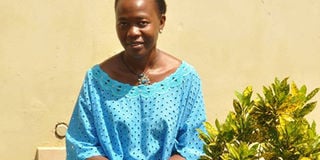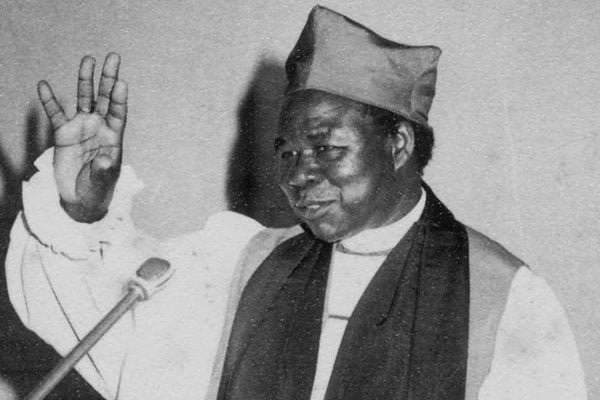Dad was compassionate - Luwum’s daughter

Humble: Phoebe Aber, the second last born of Archbishop Janani Luwum’s nine children. Photo by George Katongole
What you need to know:
- Legacy. In 2015, President Museveni declared a public holiday in memory of St Janani Luwum that is celebrated every February 16. In the United Kingdom, a street was named in memory of Luwum while an effigy at the West Minster Abey also stands in honour of the Anglican martyr. In California, USA, Luwum memorial lecture is conducted annually while Luwum Foundation in the Episcopal Church was also founded.
- Fond memories. Much as her father was murdered when she was only eight years old, Phoebe Aber, Janani Luwum’s daughter still remembers the little time she shared with her father, writes George Katongole.
Janani Luwum was killed 42 years ago. Today would have been his 97th birthday. In the six years since he seized power from Milton Obote, Uganda’s mercurial president Idi Amin ordered the execution of untold thousands of opponents.
The Most Rev Janani Luwum, Anglican Archbishop of Uganda, was among those that fell at Amin’s bloodstained hands alongside two former high ranking government officials: Internal Affairs minister Charles Oboth-Ofumbi and Land and Water Resources minister Erinayo Oryema.
Phoebe Aber, the second last born of Luwum’s nine children, was about to celebrate eight years when her father was killed on February 16, 1977. The former Member of Parliament aspirant, who battled Henry Okello Oryem for the Chua East seat in 2015, will celebrate her 51st birthday this year.
“I remember the day my dad was killed. I was preparing to go to school but mum told me ‘you are not going to school’. I cried because people were crying but surely I was too young to know what was going on,” she said in an interview.
“I don’t have very many memories but there was a time when we had issues with Erick (her brother) and I called him stupid. My dad called me and I expected to be beaten but he instead asked me for the meaning of the word stupid. I was left embarrassed and ashamed. He told me to apologise and since then I have learnt that is the best way to raise children rather than simply caning them,” she said.
READ:
Compassionate
Aber heard from other people that her dad was a very compassionate person. Although he was busy, he always found a way to meet people who were in need - asking about their lives and listening to their troubles - often doing this for many years. She remembers her dad always picking her from school at Nakasero Primary School.
“Moments such as that were precious to a little girl like me. I travelled with him a couple of times to Rwanda and Burundi. I have heard that he loved people but I was too young to comprehend that. Remarkably, he never forced us to go to church. We used to pray together as a family in our chapel and going to church was always an option,” she recalled.
Aber added: “When he was killed, I heard people speak: ‘I told him his life was in danger’. Then there were people coming home for refuge. He was always helping them. I started thinking, why did he have children when he loved the church more? My mum was always crying. I heard her cry a couple of times. For a child it is traumatising. If he was committed, why didn’t he play it safe? But at around 40 years, I began to understand my dad’s passion for serving God.”
Overwhelming loss
Aber admits that her father was a busy man who was at the same time genuinely a good man. He was obviously a preacher by choice because he never wanted anyone to trample on the rights of others.
She said in the aftermath of his execution, friends and family and the Church of Uganda comforted them.
“There are those days you woke up and there was commotion. The army one day searched for guns in our home but I did not wake up. I only remember seeing people coming home and all the whispers and a broken fence. You know some visitors are like shadows, you hardly recall anything they did or said,” she said.
On the night when his body was airlifted to Wii-Gweng Village, Mucwin Sub-county in Kitgum District, the family slept across the road. After the burial, the family was relocated to Mukono Theological College (now Uganda Christian University) then to Kenya in Kisumu at the Archdiocese of Maseno.
“We were driven up to a certain place and we walked across the border,” she recalled.
Life in Kenya was okay although she remembers her family taking her out of Aga Khan school because they could not afford the school fees and enroled her in another school.
“But I was so worried about my mother because she kept crying all night, wondering how she would cater for the family with only support from the church,” she recalls of her mum, who was a housewife.
Intricately different
Of the nine children, seven are still living. Yet none is trying to follow in their father’s shoes. Her elder brother, Ben Okello’s daughter, Rev Jennifer Luwum, who ministers in Kitgum Diocese, is the only ordained person in their immediate family.
Aber chose to specialise in botany and zoology when she completed her first degree at Makerere University before pursuing a Master’s Degree in Natural Resources Management, specialising in environmental sciences. Her training took her through work at the Uganda National Park (now Uganda Wildlife Authority), community conservations for UWA in Bwindi, National Wetlands Programme, Dutch Development Association in Karamoja, Global Water Partnerships as East Africa’s programme officer-in-charge of African Ministers’ Council on Water (Amcow) for eastern Africa, before resigning to become a mindset coach in 2013.
“It is very complex to analyse decisions people make in life. I love God but I turned my back on church things. But that is a normal rebellion of such children born to ministers. I had a resentment about church and my dad,” she said.
She has made seemingly difficult choices in life including not getting married and having children after her first attempt did not work.
She is not alone. Her youngest brother is in transport business while their elder brother Ben Okello, who once worked with the Lands ministry, is an auditor. Her other siblings include Irene a nurse in New York, Julie, a former employee of the Ministry of Lands, Andrew works with London Bus Service, and the third born Jemimah who is a retired teacher. Two of her siblings, Eric and Florence died.
“Problem is that people look at marriage as a social obligation yet to me, I don’t want to do things half-heartedly,” she said.
She shares her passion with the community by serving as the CEO of Rwot Ker, a football academy based at Guilio Pastore Primary School and Rev Jabuloni Issoke Memorial College.
More can be done
Yet Aber thinks a lot more can be done in terms of reconciliation.
“It is a golden opportunity which has not been fully utilised because it is a reminder of a very difficult time for many Ugandans. It has elements of our neighbours and Christians who lost their lives. Recently, we had a convention by Kakwa Christians from January 25 to 27th in Koboko. This is an opportunity to look at something like that can bring people together because many still carry those scars up to now. Amin’s victims still weep up to now,” she said.





